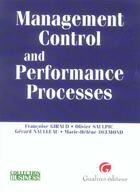-
Date de parution : 25/08/2011
-
Editeur :
Pearson
-
EAN : 9782744075193
-
Série :
(-)
-
Support :
Papier
-
Nombre de pages : (-)
-
Collection :
(-)
-
Genre :
Entreprise
-
Thème :
Entreprise
-
Prix littéraire(s) :
(-)
Résumé:
This book presents the fundamental elements of performance management, with a fucus on the managerial dimension.
It explains how management control techniques should be designed and built, based on key principles which arc determined by their intended purpose and functions. It provides clear,... Voir plus
This book presents the fundamental elements of performance management, with a fucus on the managerial dimension.
It explains how management control techniques should be designed and built, based on key principles which arc determined by their intended purpose and functions. It provides clear, structured analytical frameworks to guide the construction or performance management systems and to analyse business practices, thus striking a balance between an operational approach and a critical view of systems. The authors have chosen to examine three main areas of management contrôle.
The definition of performance and the choice of systems for performance measurement : part I explores the notion of performance from a qualitative point of view and distinguishes between company-wide measurement systems (financial indicators, company-wide performance dashboards and scorecards) and local-level measurement systems (responsibility accounting, cost accounting, responsibility centre dashboards).
The dynamic management of performance : part II presents the goals and principles of the planning process, which shape the basic management techniques (budget, operational and strategic plans) ; it then examines different methods for results analysis and success factors. The people involved in the management control process : part III highlights the complementary nature of the roles of managers and controllers.
Numerous examples and case studies drawn from a variety of business sectors are provided to illustrate the different topics covered. Each chapter is built on clear and precise definitions opening with a comprehensive list of `key messages. Two cross-functional case studies taken from real-world companies (an automobile parts supplier and a waste management company) make up the last two chapters and provide concrete illustrations of the issues explored.
Readership : undergraduates, MBA students and managers wishing to acquire frameworks for the analysis of their performance management systems.
Donner votre avis









